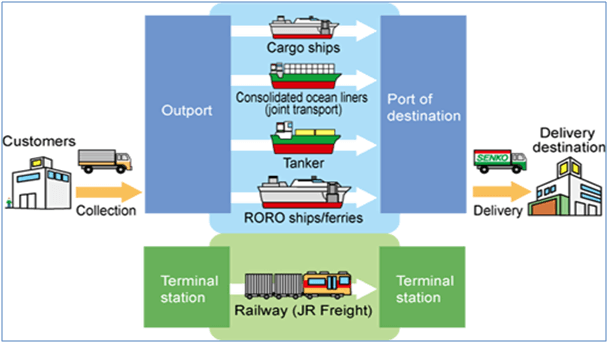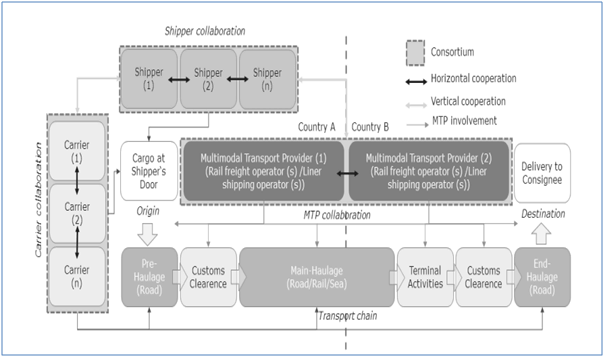Multimodal freight transport developed in the transportation sector as an alternative to unimodal transport faced with the challenges brought by the growing global demand for transporting goods. Multimodal transport is the transportation of goods using at least two modes of transport, usually door-to-door. The common transport modes include railways, maritime routes, and the roads.
When restructuring and reconfiguring their logistics strategies, freight operators seek optimal operational plans to increase cost efficiency, improve customer service effectiveness, and enhance environmental sustainability throughout their entire supply chain network.
Table of Contents
Multimodal Operational Planning
Multimodal operational planning is investigated from two perspectives: modelling modal shift policy and planning of multimodal freight transportation. The section on the modal shift focuses on evaluating modal shift transport policy measures and aims to raise awareness and consideration towards the change of transportation mode as a transport policy option. It also includes various collaboration settings throughout the freight flow from the origin to the final destination.
The section on the operational planning discusses practical planning techniques and case studies that deal with the implementation of multimodal transport at the operational level in order to assess the feasibility of a modal shift.

Modal Shift Policy
The actors of the operational side of international multimodal transport are shippers, multimodal transport providers, and freight forwarders. A shipper is the company that is responsible for initiating a shipment and who may also decide on the total freight cost. MTPs are the companies that can offer multimodal transport operations within the framework of national and international trade and transport practices in the sector. Freight forwarders play an important role in sea routes, acting as agents of shippers who are less popular to reach customers. The freight transport network consists of three essentially components including pre-haulage, main-haulage, and end-haulage. While pre-haulage and end-haulage are usually provided by road transport for short distances, the main haulage is carried out by using other types of transport such as rail, sea, and inland water for longer distances.

In the transport chain, cooperation can be established between carriers, shippers, and all MTPs. Different forms of collaboration, both vertical and horizontal are important for the competitiveness of companies. The system where the operators and shippers work together is considered as the most suitable combination of these collaborations; however, it is also the most difficult system to establish and maintain despite being the most effective. The cost components of this system should be identified and the distribution of income should be arranged carefully since it is necessary to consider revenue and cost allocations, risks and involvement of each operator. These horizontal collaborations reduce costs and increase productivity. On the other hand, time to share information and mutual self-sacrifice are required to establish and maintain mutual trust and transparency among collaborative stakeholders.

In order to be competitive in the transport sector, service providers should be more flexible favoring multimodal choices such as combination of road, sea, rail, and air. At this point, the transport service provided should be preferable by shippers and also multimodal transport providers (MTP) should arrange their services environmentally friendly. In multimodal freight transportation, uncertainties and randomness always take place throughout the freight flow process. This complexity increases the importance of reliability, smart disruption management, and sustainability of the operation while determining the decision criteria. Since the multimodal network is complex and dynamic, determining dynamic characteristics and modeling modal split are useful to forecast overall freight flow and to decide accordingly on the unknowns of future time periods.
Planning Multimodal Freight Transportation
The operational planning basically consists of deciding on which freight to accept or reject for routing and planning the overall route to transport selected vessel, train, and trucks. Freight mode choice is one of the most problematic issues while preferring the multimodal transportation. The main drivers of the decision-making process are cost, transit time, reliability, and frequency of the service. In addition to these, constraints related to the capacity of modes and nodes, pickup and delivery times should also be incorporated into the model and the associated data should be collected and gathered for taking the necessary actions.
The full content is only visible to SIPMM members
Already a member? Please Login to continue reading.
References
Aysun Mutlu. (2017). “Planning Multimodal Freight Transport Operation:
A Literature Review.” Retrieved from: http://research.sabanciuniv.edu/32682/1/2017_ISL_MutluKayikci%C3%87atay.pdf, accessed 8/9/2019.
Rui Pinto. (2016). “What Is Multimodal Transport?”. Retrieved from: http://www.multicargo.pt/blog-en/what-is-multimodal-transport, accessed 06/09/2019.
Sivalingam Munisamy, DLSM. (2018). “The Eight P’s for Effective Delivery of an Integrated Logistics Operations”. Retrieved from https://publication.sipmm.edu.sg/8-p-effective-delivery-integrated-logistics-operations, accessed 10/09/2019.
Terance Tan Zhiren, DLM. (2017). “Intermodal Freight Transportation for Effective Supply Chain Management”. Retrieved from SIPMM: https://publication.sipmm.edu.sg/intermodal-freight-transportation-for-effective-supply-chain-management, accessed 10/09/2019.

